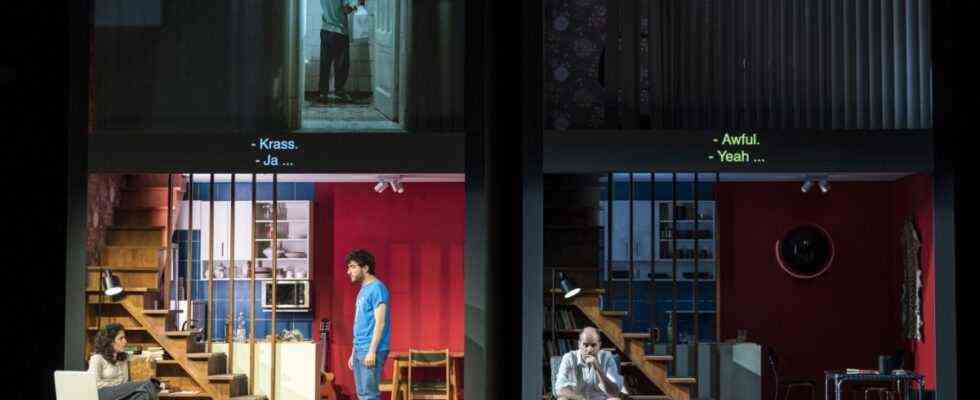The future was also better in the past, says the famous philosopher Karl Valentin. On this evening in the Münchner Kammerspiele nothing is good at all, the future told there on the right side of the stage has not improved in the least compared to the past on the left side of the stage. In this future people will only eat meat (“Since it was found out how harmful vegetables are”), and citizens go hunting because deer populate the cities after decades of eco-government. Documentary filmmaker Manuel is just as driven and just as absent in the lives of those who love him, then as now.
“Los Años”, or “The Years”, is the name of the second premiere of the Kammerspiele season. It is a co-production with the Ruhrtriennale, the HAU in Berlin, the Künstlerhaus Mousonturm and the Complejo Teatral de Buenos Aires, co-financed by the Goethe Institute. Text and direction come from the renowned Argentine artist Mariano Pensotti, a project of the “Grupo Marea” he founded. What sounds impressive at first is, however, irritatingly simple-minded as a result. So simple-minded that during the entire performance you ask yourself critically where you are overlooking a meta-level. And at the same time waits whether the aha moment does not strike, which elevates the production to something more than a nice, well-made evening broadcast. Alone: it won’t come.
Pensotti tells the story of Manuel (Paco Gorriz) from the perspective of his daughter Teodora (Bárbara Masso). The point in time named as the present is the year 2050, from there we look back to the past, the year 2020. The stage (Mariana Tirantte) is a chic, two-story, two-part house, with almost identically furnished rooms on the left and right, on one Side is 2020, the other 30 years later.
Manuel is more interested in the strange child than in his own
Manuel, as we learn in 2050, made a very successful documentary that has followed him to this day. In 2020, in the streets of Buenos Aires, he meets an orphaned boy, Raúl, he films him and becomes a kind of father figure for him. Although Manuel has a real pregnant wife, he seems to be more interested in Raúl’s fictional fatherhood. “I cry when I see a beautiful painting, but not when I see my children. That doesn’t mean that I don’t love them, it just means that the meaning they give cannot fill life”, he quotes Karl Ove Knausgård, “this Norwegian” who has been writing down his whole life, but actually, it becomes clear, he quotes himself.
Obsessed with the boy in 2020, Manuel lost contact with his protagonist Raúl in 2050, which retrospectively makes his interest in the boy implausible. How could that happen when Raúl justified his success as a director and he felt responsible for him? He now wants to find Raúl for a new film.
The staging dilutes everything interesting in cheerful chatter
The story changes quickly between the years, 2050-Manuel has a new wife, but he makes the same jokes as 2020-Manuel, he seems to see a few things differently than before due to trend reasons (“vegetables!”). It is possible that Mariano Pensotti wants to show the imprisonment in oneself, the difficulty of escaping oneself and one’s demons. The infatuation with fiction, which is often better than reality. When the real Raúl cannot be found, the daughter’s friend is supposed to play him. Manuel wants to create his own happy ending. Only the staging remains too vague, does not pursue this psychological path, Manuel’s obsession with the boy is only conveyed as a cheerful, harmless game. In the end, it is not clear what happened to Raúl, and no one finds that tragic either.
It is also possible that Pensotti wanted to tell the story of the emancipation of a daughter from her always absent father, where he turns Teodora into an authoritative narrator who always speaks to the audience. But even this idea is at most torn and watered down in the naturalistic chatter at the same, thoroughly friendly temperature of the evening. Pianist Diego Vainer delivers the friendly and gentle soundtrack for the game. “Los Años” glides on for almost two hours as feet-up-now-it’s-after-work theater, without any demand, urgency, even without any surprise. As expected like the “Rosenheim Cops” in the early evening. Although, even there it hums every now and then.

